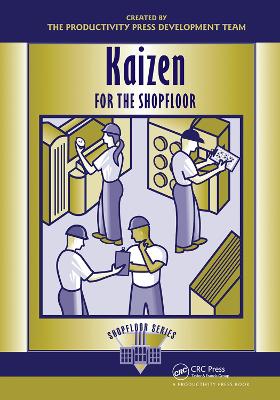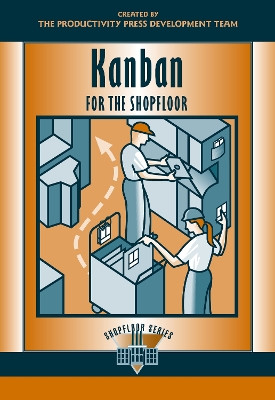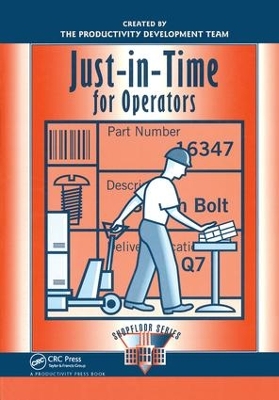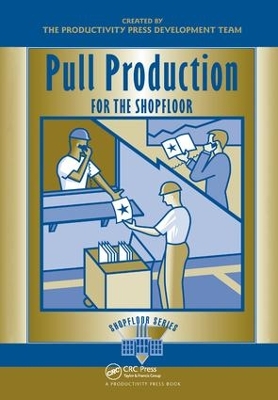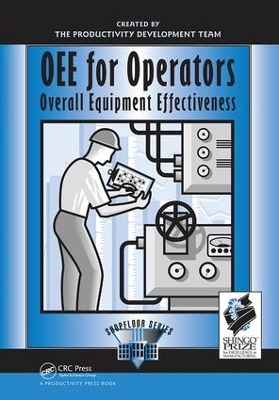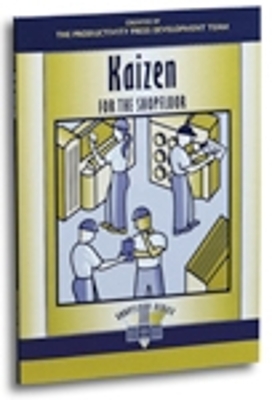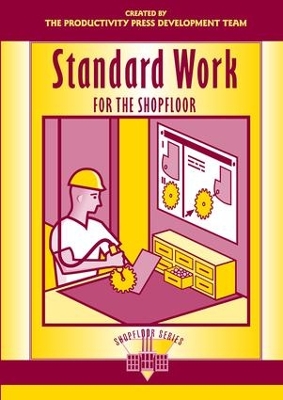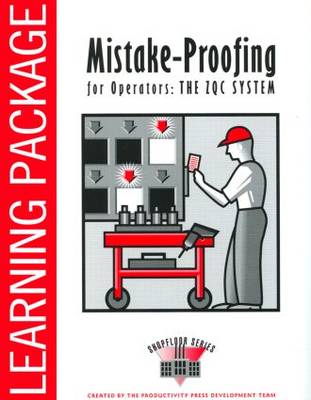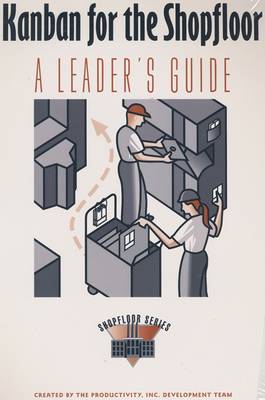The Shopfloor
10 total works
The philosophy of kaizen, which simply means continuous improvement, needs to adopted by any organization seeking to implement lean improvements that go beyond cost cutting. Kaizen events are opportunities to make focused changes in the workplace. Kaizen for the Shopfloor takes readers through the critical steps for conducting a very effective kaizen event: one that is well planned, well implemented, and well documented. As the newest addition to the Shingo Prize Winning Shopfloor Series, Kaizen for the Shopfloor distills the complexities of jump starting lean processes into an easily accessible format for those frontline employees who make lean possible.
About the Shopfloor Series: Put proven improvement tools in the hands of your entire workforce!
Progressive shopfloor improvement techniques are imperative for manufacturers who want to stay competitive and to achieve world class excellence. And it's the comprehensive education of all shopfloor workers that ensures full participation and success when implementing new programs. The Shopfloor Series books make practical information accessible to everyone by presenting major concepts and tools in simple, clear language and at a reading level that has been adjusted for operators by skilled instructional designers. One main idea is presented every two to four pages so that the book can be picked up and put down easily. Each chapter begins with an overview and ends with a summary section. Helpful illustrations are used throughout.
Kanban is the name given to the inventory control card used in a pull system. The primary benefit of kanban is to reduce overproduction, the worst of the seven deadly wastes. A true kanban system produces exactly what is ordered, when it is ordered, and in the quantities ordered. It is essentially a dynamic work order that moves with the material.
Each kanban identifies the part or subassembly unit and indicates where each one came from and where each is going. Used this way, kanban acts as a system of information that integrates your plant, connects all processes one to another, and connects the entire value stream to customer demand.
Kanban for the Shopfloor provides a working manual for those seeking to implement this method of production control in any operation. It defines the various terms and methods employed in kanbans, and illustrates how when adhered to, kanban is an element of continuous improvement that ultimately leads to the ideal of one-piece flow."
In addition to reducing the waste of overproduction, kanban will help your company increase flexibility to respond to customer demand, coordinate production of small lots and wide product variety, and simplify the procurement process.
About the Shopfloor Series: Put proven improvement tools in the hands of your entire workforce!
Progressive shopfloor improvement techniques are imperative for manufacturers who want to stay competitive and to achieve world class excellence. And it's the comprehensive education of all shopfloor workers that ensures full participation and success when implementing new programs. The Shopfloor Series books make practical information accessible to everyone by presenting major concepts and tools in simple, clear language and at a reading level that has been adjusted for operators by skilled instructional designers. One main idea is presented every two to four pages so that the book can be picked up and put down easily. Each chapter begins with an overview and ends with a summary section. Helpful illustrations are used throughout.
Other topics in the Shopfloor Series: Kanban, 5S, Quick Changeover, Mistake-Proofing, Just-in-Time, TPM, Cellular Manufacturing
In a "pull" production system, the final process pulls needed parts from the previous process, which pulls from the process before it, and so on, as determined by customer demand. This allows you to operate without preset schedules and avoid unnecessary costs, wastes, and delays on the manufacturing floor.
Pull Production for the Shopfloor introduces production teams and managers to basic pull production concepts, enabling them to begin understanding, planning, and implementing this lean tool. Use this book to get everyone on board to reduce work in process inventory, lead-time, and other profit-draining expenses. This book will enable plant managers to explain and thereby get support the support they need from higher management for their pull implementation efforts.
In this book you will learn about:
- Key concepts and applications of pull production
- The five steps to implementing a pull production system
- Production leveling
- Line balancing
- Managing pull production with kanban
- One-piece flow production
- Linking your suppliers to your pull production system
Productivity's Shopfloor Series books offer a simple, cost-effective approach for building basic knowledge about key manufacturing improvement topics. Like all our Shopfloor Series books, Pull Production for the Shopfloor includes innovative instructional features that are the signature of the Shopfloor Series. The goal: to place powerful and proven improvement tools such as pull production techniques in the hands of your entire workforce.
Key learning features include:
- Well-organized, and easy-to-assimilate learning
- Chapter overviews and summaries
- Questions throughout each chapter to help you apply the learning to your own workplace
- Drawings and illustrations
- Margin icons that flag definitions, main points, and other highlights
Overall Equipment Effectiveness (OEE) is a crucial measure in TPM that reports on how well equipment is running. It factors three elements ---the time the machine is actually running, the quantity of products the machine is turning out, and the quantity of good output – into a single combined score. Directly addressing those who are best positioned to track and improve the effectiveness of equipment, OEE for Operatorsdefines basic concepts and then provides a systematic explanation of how OEE should be applied to maximize a piece of equipment’s productivity and recognize when its efficiency is being compromised.
Features
The Zero Quality Control System (ZQC) is a mistake-proofing approach that prevents defects by monitoring processing conditions at the source and correcting errors that cause defects. Since it is human nature to make mistakes, ZQC does not blame people for errors, but instead finds ways to keep errors from becoming defects. In this breakthrough approach, mistake-proofing devices called poka-yoke are used to check and give feedback about each product or operation in the process, not just a sample. This book introduces operators and assembly workers to the basic methodology of ZQC in an easy-to-read format that covers all aspects of this important manufacturing improvement strategy.
Mistake-Proofing for Operators includes the instructional features that are the signature of the Shopfloor Series. In this series Productivity Press has taken the lead in adult education by teaming with instructional designers to develop complete programs for frontline learning. The goal: to place powerful and proven improvement tools such as ZQC and mistake-proofing in the hands of your company's entire workforce.
Winner of the 1990 Shingo Prize for Excellence in Manufacturing, Mistake-Proofing for Operators is based on Zero Quality Control: Source Inspection and the Poka-Yoke System by Shigeo Shingo
Standard work is an agreed upon set of work procedures that effectively combines people, materials, and machines to maintain quality, efficiency, safety, and predictability. Work is described precisely in terms of cycle time, work in process, sequence, time, layout, and the inventory needed to conduct the activity. Standard work begins as an improvement baseline and evolves into a reliable method. It establishes the best activities and sequence steps to maximize performance and minimize waste.
In this book you will learn about:
Productivity's Shopfloor Series books offer a simple, cost-effective approach for building basic knowledge about key manufacturing improvement topics. Like all our Shopfloor Series books, Standard Work for the Shopfloor includes innovative instructional features that are the signature of the Shopfloor Series. The goal: to place powerful and proven improvement tools such as pull production techniques in the hands of your entire workforce.
Mistake-Proofing for Operators Learning Package
by Shigeo Shingo and Productivity Press Development Team
The Learning Package does the following:
Provides the foundation for launching a full-scale implementation process Encourages workers to get actively involved in their own learning process Provides immediate practical skills for participants Offers a flexible curriculum that adapts to unique audience requirements Furnishes the tools to develop your own in-house education program for operators.
SHIPPING NOTICE: Learning Packages carry a $15 shipping charge.
This Learning Package includes:
Leader's guide5 copies of Mistake-Proofing for OperatorsA CD filled with additional presentation materials.1 copy of the classic book: ZQC: Source Inspection and the Poka-Yoke System
Kanban for the Shopfloor Learning Package
by Productivity Press Development Team
Topics include:
The difference between kanban and conventional ordering systems. Types of kanbans. Six rules for optimizing a kanban system.How to use line balancing and load leveling in regards to takt time and kanban. When and how to circulate kanban cards. How to reduce the number of kanbans. Using kanban as a visual system.The kanban learning package includes the following:
Leader's Guide 5 copies of Kanban for the Shopfloor 1 laminated job aid: A Kanban Implementation Summary 1 copy of the classic book Kanban: Just-In-Time At Toyota, and additional presentation materials on CDPurchase Separately:
Kanban for the Shopfloor book - ISBN 1-56327-269-5 $25.00 Kanban: Just-in-Time at Toyota by Japan Mgmt. Assoc. (ed), Translated by David J. Lu - ISBN 0-915299-48-8 $45.00